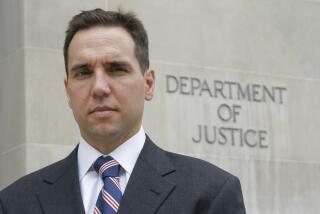Independence Is Essential in Enron Probe
- Share via
An independent special prosecutor is imperative to investigate possible criminal violations by Enron Corp., its officers and its auditor, Andersen Co. Almost every day reveals new ties between the Bush administration and the failed energy company.
Over the weekend, for example, it was learned that President Bush’s chief economic advisor, Lawrence B. Lindsey, previously a paid consultant to Enron, told the president that Enron’s failure would not have significant economic repercussions. At the end of last week, it was revealed that Vice President Dick Cheney attempted to assist Enron in obtaining a contract to construct a power plant in India. Cheney, who worked in the energy industry before his election, has refused to answer questions about his meetings with Enron officials.
The Bush administration has strong ties to Enron. Bush’s presidential election bid received $113,800 from Enron and its chairman, Kenneth Lay. Bush received another $300,000 for his inaugural committee. In comparison, Enron contributed only $13,750 to Al Gore’s campaign. In fact, Atty. Gen. John Ashcroft recused himself from the Enron investigation because of the campaign contributions he received from the company.
It appears that Enron tried to exploit its connections to the administration. Lay made repeated calls to Treasury Secretary Paul H. O’Neill, Commerce Secretary Don Evans and Energy Secretary Spencer Abraham. Enron’s president, Lawrence Whalley, made between six and eight calls to Peter Fisher, the undersecretary of Treasury. The content of these calls is not known, including whether Bush officials said or did anything improper, such as not turning the matter over to federal regulators in a manner that might have prevented some of the fiasco.
The close ties between Enron and the Bush administration demand that the investigation be handled outside the Bush Justice Department. A special prosecutor independent of the Bush administration is the only way that the public can be confident that the investigation is conducted properly and not influenced by cronyism and partisan politics.
Unfortunately, the law that provided for an independent counsel in such situations expired and was not renewed after the excesses of Whitewater special prosecutor Kenneth Starr. The law was a victim of politics, not principles.
In 1988, the Supreme Court upheld the constitutionality of the statute, the Ethics in Government Act, which provided the authority for a panel of federal judges to appoint an independent counsel. The law created an essential mechanism for taking investigations out of the Justice Department.
But Republicans always had opposed the law because of its origins as a response to the Nixon Justice Department’s participation in the Watergate cover-up. Democrats, who succeeded in passing and renewing the law, turned against it after it was used to investigate Bill Clinton--especially whether he lied about having a sexual relationship with Monica Lewinsky.
The investigation of Enron and Andersen is precisely the situation in which it is crucial that there be an independent special prosecutor.
There are serious allegations that Enron violated criminal laws--including federal security statutes--by concealing its financial problems from investors and auditors. Andersen admitted that it destroyed thousands of documents in October, November and December as Enron was failing and declared bankruptcy. This certainly raises serious concerns about whether there was obstruction of justice. Enron’s failure wiped out the savings and pensions of thousands of people and cost investors billions of dollars.
Although the statute that created the mechanism for an independent counsel selected by federal judges has expired, the attorney general still has the authority to appoint one.
In fact, before the Ethics in Government Act was enacted in 1976, attorney generals appointed special prosecutors when necessary. For example, Watergate special prosecutors Archibald Cox and Leon Jaworski both were appointed by the attorney general.
Ideally, Congress will reconsider its decision to let the Ethics in Government Act expire. While there certainly were problems with the independent counsel, the better approach would have been to fix those problems--perhaps by limiting the scope and duration of investigations--rather than allowing the statute to end. Scandals will occur in the future, and an independent counsel is the only way of providing assurance of a thorough and nonpolitical investigation.
In the meantime, the president should use his authority to order the appointment of a special prosecutor. If he refuses, Congress should demand one.
There is no other way to ensure the essential full and fair investigation.
More to Read
Get the L.A. Times Politics newsletter
Deeply reported insights into legislation, politics and policy from Sacramento, Washington and beyond. In your inbox twice per week.
You may occasionally receive promotional content from the Los Angeles Times.






